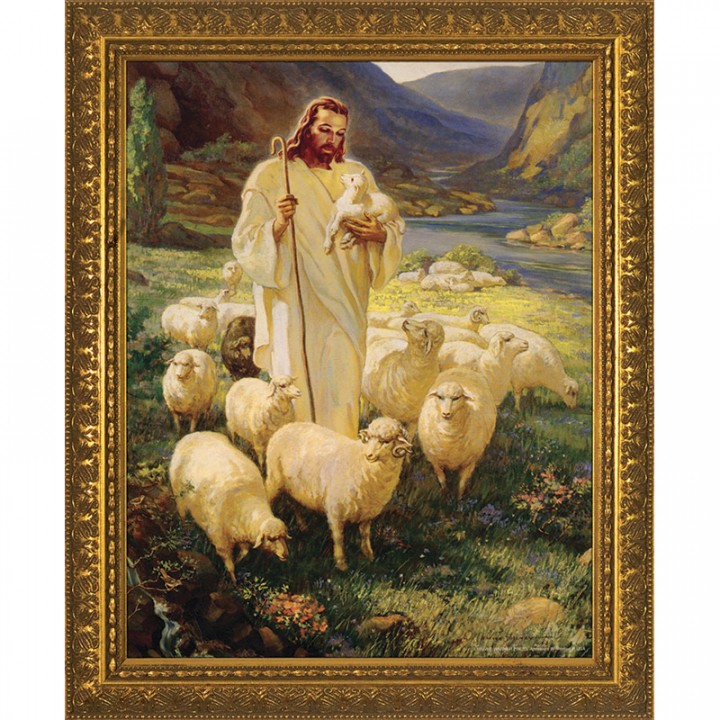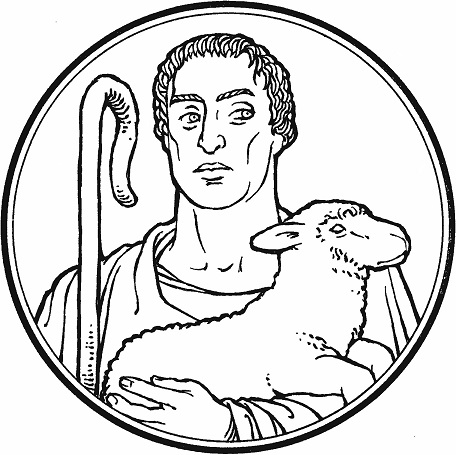Readings: Ezekiel 34:11-16 | 1 Peter 2:21-25 | John 10:11-16
Text: John 10:11-16
The name for this second Sunday after Easter is a mouthful: Misericordias Domini. It’s also a strange name, unless you’re a Spanish-speaker. Misericordias in both Latin and Spanish means “mercy.” It’s from Psalm 33:5, which we heard in the introit as, “The earth is full of the steadfast love of the Lord.” But what is this “steadfast love” and “mercy”? What does it look like, and how can we lay hold of it? On this “Good Shepherd Sunday,” we have a picture of the Lord’s steadfast love and mercy. He is the Good Shepherd, who calls and gathers His flock around Him.

But they are not just pristine, innocent lambs that He takes in His bosom. They wandered into thorn bushes and thickets. Without a shepherd, they have vied for power and shouldered the weak aside. Some have been torn by wolves and left for dead. Others have grown “fat and strong” on pastures they took for granted. These are what the Lord’s sheep look like. So, to look at the mercy of the Lord is to see how the Lord gathers His wandering sheep.
The reading from Ezekiel 34 tells how the Lord Himself will “seek out [His] sheep and rescue them from all places where they have been scattered on a day of clouds and thick darkness.”[1] This refers to the time when the Lord’s flock was gathered at the base of Mount Sinai:
16 On the morning of the third day there were thunders and lightnings and a thick cloud on the mountain and a very loud trumpet blast, so that all the people in the camp trembled… 18 Now Mount Sinai was wrapped in smoke because the Lord had descended on it in fire. The smoke of it went up like the smoke of a kiln, and the whole mountain trembled greatly. 19 And as the sound of the trumpet grew louder and louder, Moses spoke, and God answered him in thunder. 20 The Lord came down on Mount Sinai, to the top of the mountain.[2]
From Mount Sinai, the Lord gave His Law. To that frightful sight, the people swore, “All that the Lord has spoken we will do, and we will be obedient.”[3] But they didn’t, and they weren’t. And they couldn’t.[4] Just 40 days later, they were fashioning a golden calf, calling it the Lord, and bowing down to it.[5] The only thing that saved them that day was Moses’ intercession, where he implored the Lord to remember the promise made to their fathers.
But there was another mountain. It was a mountain in the Promised Land, just outside Jerusalem. The glory of the Lord once again appeared over this mountain. Thick darkness covered it, and the Lord was at the top of this mountain. But this time the threats were not against the people. The darkness lasted for just three hours, and the voice of God did not thunder, but choked out His dying words:
45 Now from the sixth hour there was darkness over all the land until the ninth hour. 46 And about the ninth hour Jesus cried out with a loud voice, saying, “Eli, Eli, lema sabachthani?” that is, “My God, my God, why have you forsaken me?”… 50 And Jesus cried out again with a loud voice and yielded up his spirit.[6]

On this mountain, the wrath of God against all human sin was satisfied. “I am the good shepherd…I lay down my life for the sheep.” God’s only-begotten Son laid down His life to redeem the flock of God.[7]
Later in chapter 12 of John’s Gospel, Jesus would speak of the cross in this way: “And I, when I am lifted up from the earth, will draw all people to myself.”[8] This is center point of the Good Shepherd’s call. He calls the wandering sheep of Israel—and truly of all nations—to the cross. There, as Zechariah wrote, the shepherd is struck. For a time, the sheep are scattered, but soon, the Lord says, “They will call upon my name, and I will answer them. I will say, ‘They are my people’; and they will say, ‘The Lord is my God’.”[9] The Good Shepherd’s call to the wandering sheep is to where He washes them from all their filthy sin and makes them His very own. “I am the good shepherd. I know my own and my own know me.”
In clouds and thick darkness, when God’s holy Law brings death and hell, sinful sheep are scattered and frightened. They are helpless and hopeless until the Lord, their Shepherd, gathers them to His cross. Only there, can the terrors of God be silenced. Only the precious blood of Jesus can wash sins away. “Come now, let us reason together, says the LORD: though your sins are like scarlet, they shall be as white as snow; though they are red like crimson, they shall become like wool.”[10] The Lord Himself restores His stained and diseased sheep, so that they live before Him in righteousness and purity forever.[11]
This is the economy of God: those sheep who were stubborn, who were lost, who even scoffed at the Shepherd, who longed to rescue them—are absolved. No more are their pushing and shoving counted against them!. The Good Shepherd has “laid down His life so that He may take it up again.”[12] He laid down His life so that they might rise with Him. They now hear their Shepherd’s voice and follow only Him. “They will listen to my voice. So there will be one flock, one shepherd.” Only the Good Shepherd can guide them to “good pasture, grazing on the mountain heights of Israel.”[13] Only He can lead them has His redeemed flock, protected from the wolves and well-tended both in body and soul.
But, the Lord also tells us, “I have other sheep that are not of this fold. I must bring them also, and they will listen to my voice.” His call from the cross continues to go out! Now, He rules in heaven, the Lamb whom all the heavenly host adore, but His voice is still heard on earth. It’s heard among His flock every time they gather for worship. The Lord says, “I will seek the lost, and I will bring back the strayed, and I will bind up the injured, and I will strengthen the weak, and the fat and the strong I will destroy. I will feed them in justice.” This sets things straight when it comes to missions. It’s all too easily to manipulate people by the fear that people are going to hell if you don’t do _______. This is dishonest, and does not allow God to be the author of faith. In the Word preached, in the Word washing, in the Word binding and loosing from sin, and in the Word eaten and drunk for the forgiveness of sins, the Good Shepherd cares for His flock.

Ultimately, there will be one flock, even as there is one Shepherd. All of us together hear His voice and listen—the flock of old in Israel, the flock in Lebanon, and the flock that will be. What unites this flock is not the name of a church body like “Lutheran Church—Missouri Synod.” It’s not the citizenry of a certain country. It’s not in outward appearance and personality. The Church is those who hear their Shepherd’s voice. To put it another way, “Blessed are those who hear the Word of God and keep it.”[14] They do not refuse Him who speaks,[15] but follow where He leads. He calls His sheep, He cleanses them from their iniquities, He renews them, and He leads them to green pastures.
At the Last, the one Good Shepherd will gather His flock all around Him. They will be delivered from every evil of body and soul, possessions and reputation,[16] and they will dwell in the house of the Lord forever. Amen.

[11] Small Catechism, IV, “What does such baptizing with water indicate?”

Leave a Reply